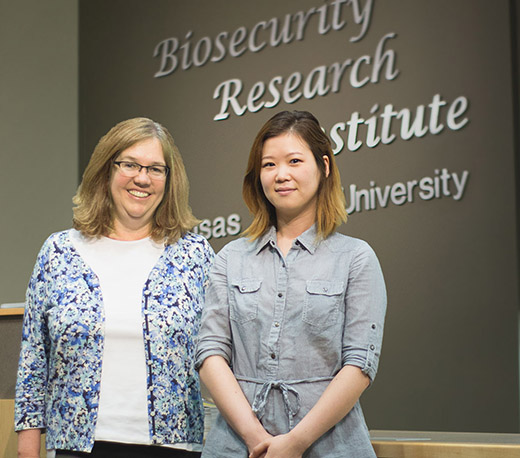Kansas State University conducts first U.S. livestock study with Japanese encephalitis virus
Monday, June 18, 2018

Kansas State University's Dana Vanlandingham, associate professor of diagnostic medicine and pathobiology, left, and So Lee Park, third-year veterinary student and concurrent doctoral student in pathobiology, are authors of recently published research on the susceptibility of North American domestic pigs to Japanese encephalitis virus infections. Park is the study's first author and Vanlandingham is one of its corresponding authors. | Download this photo.
MANHATTAN — North American domestic pigs could be susceptible to Japanese encephalitis virus infections according to a study by Kansas State University College of Veterinary Medicine researchers. The study is believed to be the first of its kind in the U.S.
The researchers' study was published recently in Scientific Reports.
"Collectively, our study demonstrates for the first time that North American domestic pigs can contribute to the Japanese encephalitis virus transmission cycle as amplifying hosts," said So Lee Park, a third-year veterinary student and concurrent doctoral student in pathobiology who was first author of the study.
Japanese encephalitis virus is a mosquito-transmitted flavivirus that has human and veterinary health significance.
The virus, according to the Centers for Disease Control and Prevention, is transmitted through the bite of a mosquito and is the leading cause of vaccine-preventable encephalitis in Asia and the western Pacific. The virus can be maintained in a cycle between mosquitoes and vertebrates, mainly pigs and wading birds. While most human infections are mild, a small percentage of people develop encephalitis — an infection of the brain — that can include headache, high fever, tremors, coma and more. The CDC says about 1 in 4 cases of Japanese encephalitis are fatal.
Japanese encephalitis virus in swine can cause encephalitis in piglets and reproductive diseases in mature adult pigs.
The Kansas State University study suggests that Japanese encephalitis virus may have the potential to become endemic in the U.S. after an introductory event similar to the recent emergence of West Nile virus, a closely related flavivirus, said Dana Vanlandingham, associate professor of diagnostic medicine and pathobiology and corresponding author.
Earlier research at Kansas State University found that some North American mosquitoes can transmit the virus.
"This means that all components of the transmission cycle are present in the U.S.," said Scott Huang, assistant research professor of diagnostic medicine and pathobiology.
While an introductory event involving Japanese encephalitis virus has yet to happen in the U.S., the Kansas State University researchers recommend increased international and possibly local surveillance of the virus through diagnostic methods. They said that Japanese encephalitis virus is both a significant swine and human pathogen that cannot be ignored.
The research was conducted at Kansas State University's Biosecurity Research Institute. Support for the research was provided in part through a National Bio and Agro-defense Facility, or NBAF, transition grant from the state of Kansas. Japanese encephalitis virus is a priority pathogen that will be studied at NBAF, a federal facility that is under construction adjacent to the university's Manhattan campus. NBAF will be the nation's foremost animal disease facility.
Other Kansas State University contributors to the study included Amy Lyons, research assistant in diagnostic medicine and pathobiology and a master's student in biomedical science; Victoria Ayers, doctoral student in pathobiology; Susan Hettenbach, research assistant at the Biosecurity Research Institute; Kenneth Burton, program director of the National Agricultural Biosecurity Center at Kansas State University; Stephen Higgs, director of the Biosecurity Research Institute and professor of diagnostic medicine and pathobiology; and Scott McVey, a U.S. Department of Agriculture collaborator and director of the Center for Grain and Animal Health Research in Manhattan.
